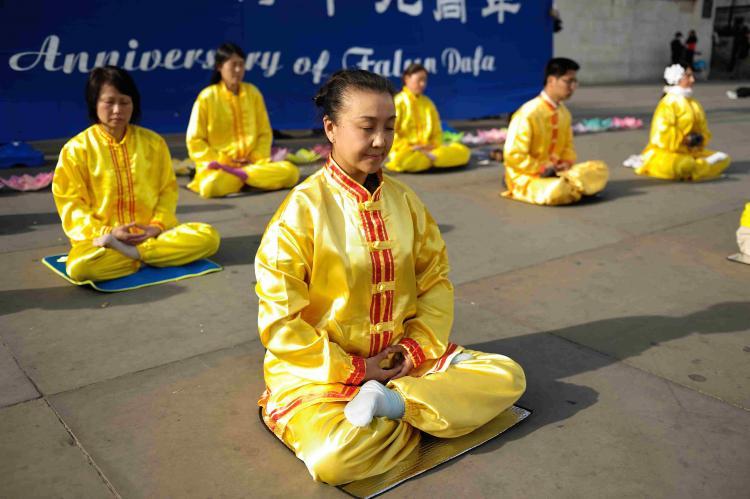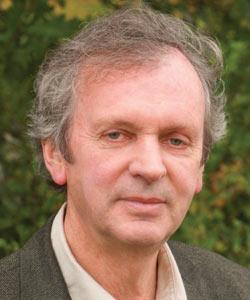Gentle exercises and calm Chinese music introduce a practice with its roots in the ancient world but its feet firmly planted in the present.
This is World Falun Dafa Day, a celebration not only of the well-known qigong practice, but of the resilience of its adherents in China.
Around 100 people gathered at Trafalgar Square’s north terrace in London on Saturday, May 14th, to celebrate the day.
World Falun Dafa Day, held on May 13th each year, is a celebration for members of the spiritual practice Falun Gong (also called Falun Dafa). It is the anniversary of the day the founder of Falun Gong, Li Hongzhi, began publicly teaching the practice in China. It is also Li Hongzhi’s birthday.
The 100 attendees demonstrated Falun Gong’s meditative exercises, sang songs, gave speeches, and distributed flyers to passers-by. A Chinese calligraphy artist wrote inscriptions for anyone who asked, while others gave out origami lotus flowers, a symbol of purity and beauty in Chinese culture.
Falun Gong Founder Li Hongzhi
Li Hongzhi first taught Falun Gong in a schoolhouse in Changchun in northeastern China in 1992. At the time, Falun Gong was known as one among many qigong practices that were offered to the public in China.
Falun Gong involves practising five meditative exercises and living according to teachings based on the principles of truthfulness, compassion, and forbearance.
The popularity of Falun Gong grew rapidly as many people reported improved health through practising the exercises. The spiritual side of Falun Gong also appealed to a large portion of the Chinese public in an increasingly materialistic Chinese society. In 1996, the main book of Falun Gong, Zhuan Falun, became a best-seller in China.
In February 1999, US News and World Report, citing state officials, reported that between 70 and 100 million people in China were practising Falun Gong. Falun Gong sources say the number of practitioners was in fact over 100 million at that time.
Yudong Gao, who came to the UK from China, attended the event. She told The Epoch Times: “Before 1999, Falun Gong was very popular and welcomed by Chinese people. I learned Falun Gong from my mum. She knew about it from a friend.”
She praised Falun Gong founder Li Hongzhi: “He is a great man, from my point of view. He introduced Falun Gong to the public and brought benefits to many people.”
Londoner Zek Halu also attended. “I had lots of injuries from martial arts and they started vanishing a few weeks after I started doing the exercises,” he said. “It was so fast that I nearly missed it. On the health front, lots of things got sorted out in my body.
“I feel great about Master Li [Falun Gong followers often refer to Li Hongzhi as ”Master Li“, in keeping with Chinese tradition]. The main feeling is gratitude because he has given me something that entirely changed my life. I don’t just mean that my health just got a little bit better, the whole direction of my life, everything I do, every aspect of my life has changed and for someone to do that, how do you pay them back? There is no way I can pay back what I have been given.”
In addition to the celebrations, the event also touched upon the ongoing persecution of Falun Gong in China. Practitioners passed out a petition, asking the public to urge David Cameron to condemn the persecution of Falun Gong in China and to demand the immediate release of all family members of UK residents imprisoned inside China for practising Falun Gong.
Next Page Basic human rights removed
Basic human rights removed
Annie Yang, who fled to the UK from China in 2006, told how she was targeted by the Chinese Communist Party for her belief in Falun Gong. “Eight men burst in one night but only one of them was in police uniform,” she recalled.
“The rest were in normal clothes. I guess they were from the National Security Department.
“They took away my computer and my Falun Gong books. They took me from my 16-year-old son and put me in the local district detention centre. I didn’t see a lawyer and there was no mention of court. Forty days later I was sentenced to two years in a labour camp in Beijing.”
“In the camp, they removed all of our basic human rights,” she continued. ”We were not given enough food or water, only 500 ml of water and 30 grams of bread a day. All my hair turned white because of the pressure. I was not allowed to sleep for more than a few hours a day, or to shower or change my clothes and all because I refused to renounce my beliefs.”
‘Most Acclaimed Qigong Master’
Falun Gong has not always been disapproved of by the Chinese authorities, however. In 1993, the official newspaper of China’s Ministry of Public Security – The People’s Public Security News – praised Li Hongzhi for “promoting the traditional crime-fighting virtues of the Chinese people, in safeguarding social order and security, and in promoting rectitude in society”. That same year, Falun Gong was invited to Beijing’s Asian Health Expo and Li Hongzhi was awarded the title of ”Most Acclaimed Qigong Master” by the expo organisers.
As the practice grew in popularity, the authorities became increasingly fearful of Falun Gong, which developed largely outside the control of the Communist Party. China’s Ministry of Propaganda banned the book Zhuan Falun in 1996 but copies continued to be printed and circulated. On July 20th, 1999, the then-leader of the Chinese Communist Party, Jiang Zemin, ordered the “eradication” of Falun Gong. What followed may be the largest religious persecution in the world today. According to the NGO Falun Dafa Information Centre, hundreds of thousands have been detained in jails, prisons, brainwashing centres, psychiatric hospitals, and labour camps. It estimates the deaths due to torture and abuse to be in the tens of thousands.
According to a report by the former Canadian Secretary of State David Kilgour and the human rights lawyer David Matas, it is alleged that Falun Gong followers are victims of live organ harvesting throughout China. The organs are harvested from the followers while they are still alive. They are killed in the course of the organ harvesting operations or immediately thereafter. Their bodies are cremated and there is no corpse left to examine to identify as the source of an organ transplant. According to the report, organ harvesting takes place “at a wide variety of locations, pursuant to a systematic policy, in large numbers”.
In spite of this persecution, the Falun Dafa Information Centre estimates that between 20 and 40 million people continue to practise Falun Gong in China. The Falun Gong clearwisdom.net reports receiving cards and letters from 300 regions inside China wishing Li Hongzhi a happy birthday.






